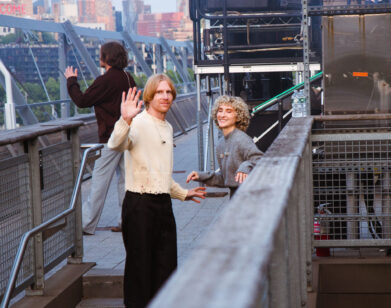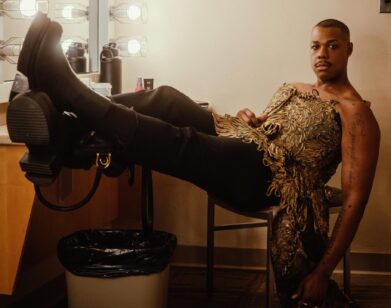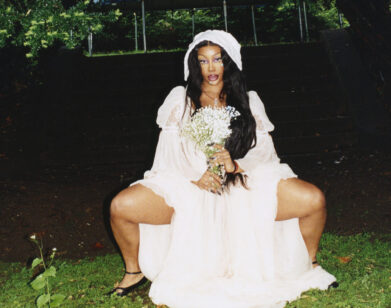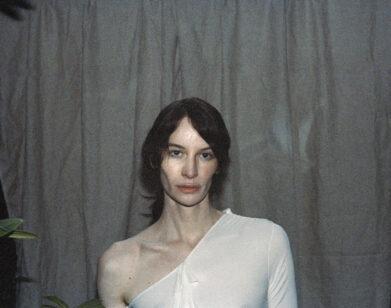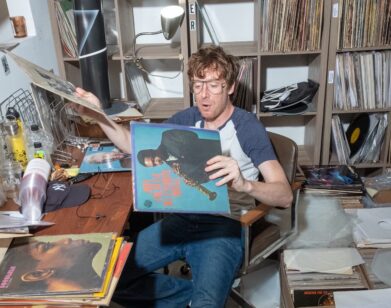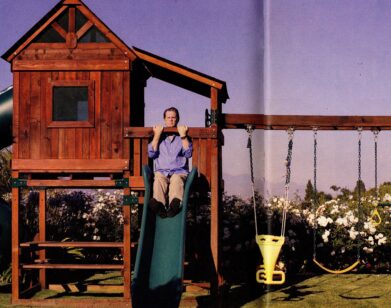Sondre Lerche’s Barn Identity

PHOTO COURTESY OF RUVAN WIJESOORIA
Most artists who plan on releasing a self-titled album do it straight out of the gate: for their debut, or maybe sophomore, release, in order to introduce their sound to the world. But at this point, Norwegian-born indie-popper Sondre Lerche needs little introduction: his jazz-inflected melodies have been pumping in earbuds from Norway to the US and beyond for a solid decade, since his lauded debut, Faces Down, was released in 2001. Between Faces Down and his last release, 2009’s Heartbeat Radio, Lerche recorded four more studio albums—plus the soundtrack to the Steve Carell film Dan in Real Life—and, at this point, no one could accuse him of being a newcomer.
So it was a bit of a mystery, going into our chat with Lerche, why he’d choose to name his sixth album Sondre Lerche: did it represent some fundamental shift in his identity? And there were some other mysteries, too: what’s it like to play music in a barn? Why does writing have to be lonely? And how, for once and for all, is Sondre Lerche pronounced? He was kind enough to clear all that—and more—up for us.
CHLOE EICHLER: You’re on sort of a mini-tour right now, right?
SONDRE LERCHE: Yeah, we are doing a tour with this amazing website that you may know of called Daytrotter. They do an annual tour of barns, where they get a bunch of bands to play barns in the Midwest, sort of the area where Daytrotter is located. So I’m headlining that tour this week.
EICHLER: Of literal barns?
LERCHE: Yeah! Yeah, the finest barns in the Midwest. We played one in Minnesota yesterday, it was beautiful. They find barns that are owned by people who are looking to do creative stuff and fun stuff with their barns. So the one we played yesterday, they have a film festival every summer. I don’t know what’s going on in the one we’re playing tonight, but it’s in Illinois. I’d never played a barn before yesterday, so it’s going to be interesting. I’m definitely going to get my share of barn-playing this week.
EICHLER: Is there anything you learned last night that you definitely can’t do in a barn?
LERCHE: [laughs] What did I learn yesterday? I learned that barns in general are very, very cold. It was a very cold and rainy day in Minnesota. I guess the barns aren’t really that up to speed when it comes to modern ways of heating up places where people live. I think we were three or four songs into the set before I could feel my fingers, and I think that’s about the time we started sounding really good.
EICHLER: I wanted to ask you a little bit about your songwriting process. One thing I think is pretty consistent in your songs—you’ve managed to do the genre-skipping thing, and move between styles—is that the guitar strum and your fingerwork on the guitar is the core of your songs. I was wondering if you compose on the guitar.
LERCHE: Yeah. When I write, I’m sort of old-fashioned in the sense that I like to write something that I feel I could just perform alone, obviously, because I do that a lot in concert. So I try to make a song where there is as much that is as distinct as I can get it, just if I’m playing it or if I’m singing it, to you, or, you know. That makes me really do a lot of stuff in the guitar work when I sit and try to figure out how to indicate what sort of dynamic I’m aiming for. Where, rhythmically, I want to go. That’s sort of what ties a lot of these different records together, is that it’s usually always based around me singing and playing a guitar. From then on out, I like to do all sorts of different things in the studio that sort of break down the realism of the sort of singer-songwriter thing. Sometimes it can get really boring if it’s just guitar and voice, and people are sort of sleepwalking around that. So I like bold, exciting things to happen around that sometimes, but in order to justify very different things you can do in the studio, I need the song to be really distinct and specific and hold its own.
EICHLER: Where do you do most of your writing?
LERCHE: Most of it, I would say, I probably do in my bedroom. I have a little workroom in the basement where I sit, and I can sit and make noise and all that. But writing, I find I often end up just sitting on my bed, strumming and writing and singing. It’s a very long and lonely process, the whole writing thing, and I think that’s why I like to record with people. I don’t particularly enjoy standing alone and recording my own voice or my own stuff. It’s sometimes fun to do for demos and stuff, but I really enjoy the social act of recording records, because writing it is so lonely. And it has to be.
EICHLER: It has to be?
LERCHE: Well, at least for me. I’ve hardly ever really written a song with anyone else. And if I have, it’s been, like, long-distance, via email. I tried once to write a song with a friend in the same room, and it was a terrible, terrible experience.
EICHLER: Are you guys still friends?
LERCHE: Yeah, we’re still friends, we just don’t try to do that again. It’s strange; it probably takes practice, but I’m either completely overpowering or I’m completely passive. I couldn’t really find anything in between. At least in that one instance where I tried to write a song with a friend. But then I wrote via email with a friend of mine who’s a singer-songwriter, and that was really cool. But then it was more determined, like, I did the music and she did the lyrics. The line sometimes blurred, which was fine, but mainly I was providing music and she was doing lyrics, and we did it via email so you could go back and forth a lot. I just think the idea that you’re going to sit in a room and try to hope that both people will have an inspired moment there and then—I just know from writing songs myself, it takes so long to get to the inspired moment, and there’s no shortcut. You just have to work and stay at it. So, the chances of that happening to two people at the same time in the same room, I feel like you would have to sit in a room together for weeks in order for inspiration to actually occur.
EICHLER: How was the recording process for this album? You did it in Brooklyn, right? Was that any different?
LERCHE: Yeah, it was different. I’ve done a lot of records where I’ve gone home to Norway. Even though I’ve lived in New York the last six years, I’ve gone home and done records in Norway with my old crew there. I’m very attached to them. But for this record, it just felt meaningful to make a record where I live, and with a lot of new friends that I’ve come across and that I really wanted to explore collaboration with. And I didn’t want to spend too much time in the studio, I didn’t want to over-labor the whole thing. I wanted to really try to get to the core of my instincts, and also trusting the people around me and their instincts. So yeah, one of the greatest things about making the record was the whole collaboration with the guys who play on the record, who really elevated things and were up to the challenge. And the fact that I wanted limitations. My last record was about no limitations. So this record, I wanted to enforce limitations—time limitations, even budget limitations. That’s not such a sexy thing to talk about. It’s nice to have some sort of ceiling to stretch towards. I don’t know, I really enjoy the concept of having limitations on this record.
EICHLER: Did they all, in the end, work out for the good of the record?
LERCHE: Yeah, I feel so. The great thing to me about this record is a lot of it is a mystery to me. Because we had these limitations; we had two weeks to record, we had one week to mix. I didn’t really have any thorough demos, I just had the acoustic versions that I’d done. So we didn’t have that much to work from, except songs that I really believed in and that felt more personally motivated in a way, storytelling-wise, than I’ve had before. It felt very grounded in that sense. But because we worked so fast, we had to just go on instinct. When I look back and listen to the record, a lot of what goes on there is sort of a mystery to me. I usually remember how things happen, but with this record it’s sort of mystical. I don’t quite remember why it ended up that way.
EICHLER: So, one last thing. Did you name this, your sixth album, after yourself so that Americans would finally learn how to pronounce your name?
LERCHE: [laughs] You know what, by this time I’ve gotten so used to so many different pronunciations of my name that I answer to almost anything that slightly resembles “Sondre Lerche.” So no, that was not the reason. I remember my first record we had a sticker on that was a phonetic way to pronounce my name, and still, you know. I can’t do that with every record, so I’ve just sort of given up. The way I pronounce my name in Norway is not even something I expect anyone to be able to pronounce, so there’s an Americanized version that is something similar to Sondre Lerche.
EICHLER: How would you do it at home in Norway?
LERCHE: [very quickly, with a heavy accent] Sunn-dur Lah-kee-ah.
EICHLER: Oh my god.
LERCHE: Yeah. I don’t expect that of you or hardly anyone else. It’s strange, I don’t even know—when people ask me, “So how do you pronounce your name?,” I’ll say an Americanized version, but I don’t even know, like, is that the one we decided on? Or have I started bastardizing it also? So, I’m not that sensitive to that. But no, the title is basically because I lost the title. I had it in a dream. You know the feeling when you know you have…
EICHLER: You wake up and it’s gone?
LERCHE: Yeah, when you wake and it’s very vivid in your head, but there’s no way of articulating it. You just have the feeling of having experienced something or knowing something, and there’s no way to convey it in any way. And I had the title, and I lost it. So I just said fuck it, we’ll just let it be self-titled.
EICHLER: Well, thank you so much for your time.
LERCHE: No, thank you.
EICHLER: I hope your barn is warmer tonight.
LERCHE: You know what, we just got word that it’s heated. So I think we’re going to be just fine.
SONDRE LERCHE IS OUT JUNE 7 ON MONA RECORDS. HE’LL PLAY AT BOWREY BALLROOM TOMORROW NIGHT AND CONTINUE TO TOUR THROUGHOUT JUNE. FOR MORE ON LERCHE, VISIT HIS WEBSITE.

